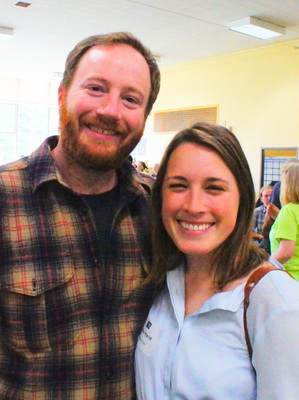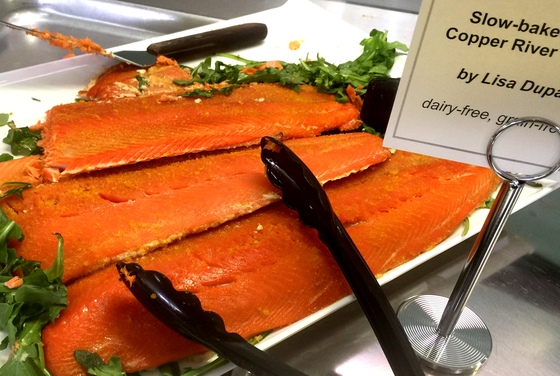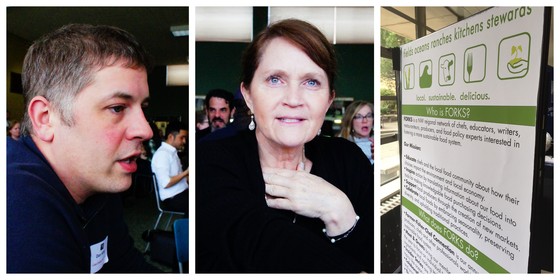The sockeye salmon fillets glistened on the serving line, an almost impossibly luscious persimmon, dusted with blood orange powder; they were the standout dish in a lineup of hand-nurtured, bottle-raised, artisanal grains and heritage stews. They'd been delivered flash-frozen to Lisa Dupar's catering operation in Redmond; the salmon fillets had been seasoned with nothing mroe than salt by executive chef Dan Kiley, then slow-baked for 25 minutes in a 190-degree oven. This was lunch for a tough crowd, a daylong conference of local food professionals called FORKS (Fields Oceans Ranches Kitchens Stewards), on the campus of Bastyr University.
The texture and flavor were jaw-dropping. This is the salmon that Canlis serves. This is the salmon that you should seek out and serve at your next buffet. Do not attempt fancy techniques; they will be wasted on this fish.
 This particular sockeye was brought to Seattle by two young fishers who spend the off-season in a house on Guemes Island, just across the channel from Anacortes: Michael and Nelly Hand. He's from Maine, she's from Alaska; they grew up in "fishing families" and met one summer when their boats were tied up in Cordova. Now they're married and have their own boat, a relatively tiny, 31-footer called the Pelican. And they fish the Copper River estuary with shallow gill nets a couple of times a week for a day or two at a time (depending on the strict regulations promulgated by Alaska Fish & Game). Tight quarters but cozy. They'll drop the nets for half an hour, then pull in between 500 and 1,500 pounds of salmon, which must be quickly bled and iced before the boat returns to the processing facility in Cordova. "That's the key," Michael says, "bleeding the fish." Just as important, adds Nelly, is handling each fish like a baby. The Hands are pioneers in person-to-person marketing of seafood in the same way that farmers sell produce as "Community Supported Agriculture," except that this is "Community Supported Fishery." You pay half up-front, at the beginning of the season, which supports the upfront costs of fishing and harvesting; your share of fish (individually quick-frozen and cryovac'd) is delivered after the season closes.
This particular sockeye was brought to Seattle by two young fishers who spend the off-season in a house on Guemes Island, just across the channel from Anacortes: Michael and Nelly Hand. He's from Maine, she's from Alaska; they grew up in "fishing families" and met one summer when their boats were tied up in Cordova. Now they're married and have their own boat, a relatively tiny, 31-footer called the Pelican. And they fish the Copper River estuary with shallow gill nets a couple of times a week for a day or two at a time (depending on the strict regulations promulgated by Alaska Fish & Game). Tight quarters but cozy. They'll drop the nets for half an hour, then pull in between 500 and 1,500 pounds of salmon, which must be quickly bled and iced before the boat returns to the processing facility in Cordova. "That's the key," Michael says, "bleeding the fish." Just as important, adds Nelly, is handling each fish like a baby. The Hands are pioneers in person-to-person marketing of seafood in the same way that farmers sell produce as "Community Supported Agriculture," except that this is "Community Supported Fishery." You pay half up-front, at the beginning of the season, which supports the upfront costs of fishing and harvesting; your share of fish (individually quick-frozen and cryovac'd) is delivered after the season closes.
For her part, Chef Dupar grew up in Atlanta, started cooking at home because her mother wasn't interested. She entered an apprenticeship at the Peachtree Plaza hotel after high school, made her way to Zurich and cooked in European hotels, and, in 1984, landed in Seattle at the Palm Court, the first female chef at a Westin Hotel property.
She left the hotel biz to open her own place, Southern Accents, as well as a catering company to provide stylish, high-quality food for private events in the growing market on Seattle's eastside. (She really was there before Microsoft took over Redmond.) She and her husband, Jonathan Zimmer, opened Pomegranate Bistro in Redmond, an intimate spot adjacent to the spacious catering kitchen and have never looked back. Her current exec chef, Dan Kiley, moved west from Rhode Island; he'd done a professional externship at the Salish Lodge while studying at Johnson & Wales University.
Exec chef Dan Kiley of Lisa Dupar Catering; Lisa Dupar; poster for Farmer-Fisher-Chef Connection


Leave a comment